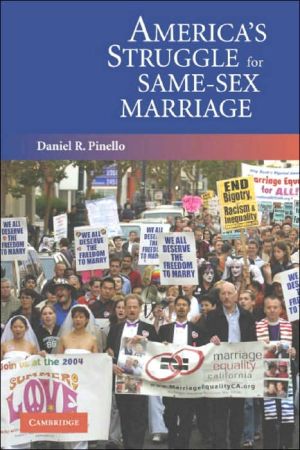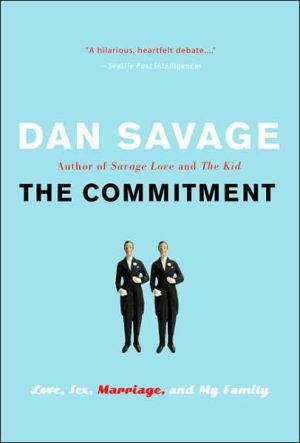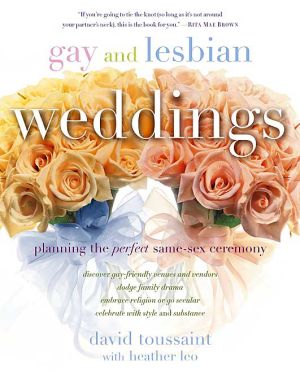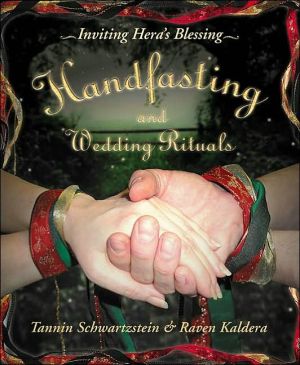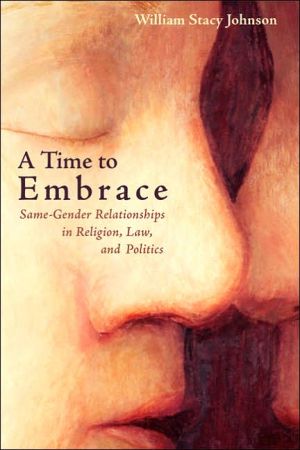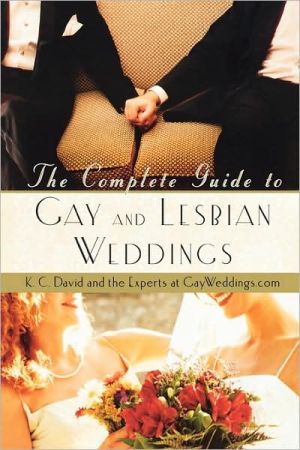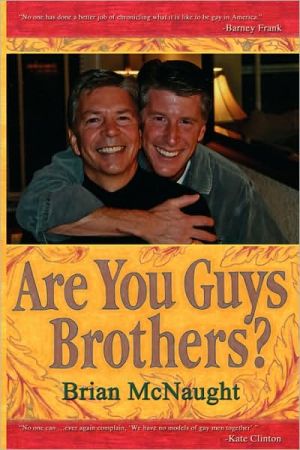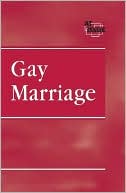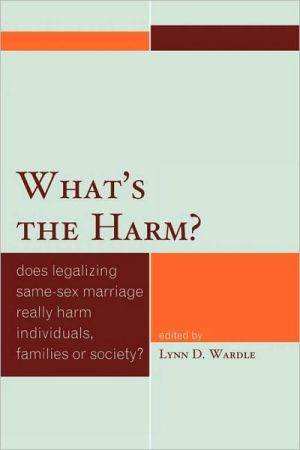America's Struggle for Same-Sex Marriage
America's Struggle for Same-Sex Marriage chronicles the evolution of the social movement for same-sex marriage in the United States and examines the political controversies surrounding gay people's quest for access to the civil institution of marriage. The book focuses on the momentous events that began in November 2003, when the Massachusetts Supreme Judicial Court declared unequivocally that the state's conferral of marriage only on opposite-sex couples violated constitutional principles of...
Search in google:
Chronicles the evolution of the social movement for same-sex marriage in the United States.
\ \ Cambridge University Press\ \ 0521848563 - AMERICA’S STRUGGLE FOR SAME-SEX MARRIAGE - by Daniel R. Pinello\ \ Excerpt\ \ \ \ \ \ Introduction\ VICTORIA DUNLAP WAS IN A DITHER. Someone called her office with a question she couldn’t answer: Would she issue marriage licenses to same-sex couples?\ In 2000, Dunlap was elected as the first Republican to the office of clerk of Sandoval County, New Mexico, in more than forty years. With the motto “Unity through Diversity,” she campaigned as a reformer. The thirty-year incumbent clerk was leaving because of term limits and had handpicked her chief deputy to succeed her.\ But Dunlap sensed a political opportunity, because the clerk’s office was tinged with allegations of cronyism and corruption. Clerks run local elections in New Mexico, and the Sandoval County incumbent, employing questionable redistricting maneuvers, was accused of having thwarted people seeking public office. Moreover, her shop was under a consent decree regarding the supervision of Native American voting. Spending less than $1,000, while designing and painting her own campaign signs, Dunlap beat the chief deputy in a close election, with absentee ballots determining the outcome.\ Dunlap and her husband have two children. An artist by trade, she sold her first painting at the age of seventeen and has a history of questioning the social and political order. As a high school student in Salt LakeCity, she circulated a petition against the closing of local parks on the sabbath. The first real taste of politics came when she had to speak at a public forum on the Sandoval County schools. Her son had attention deficit disorder and was in a special education program with a particularly skillful teacher. But her house was redistricted away from that school, and Dunlap fought for her child to stay there under an open enrollment bill. She also had been a Crime Watch activist and worked on EPA-regulated road-building projects.\ Dunlap became a Republican because the party’s local operatives were the most reliable in helping her to solve problems and because she admired New Mexico’s progressive Republican governor, Gary Johnson, who promoted the decriminalization of drugs.\ Once in office, Dunlap sought to modernize the operation. A big project was the digitizing of 1.8 million documents that the clerk maintains. She also mandated that her staff abide by the strict rule of law and find out the correct answers to questions that constituents asked.\ So, in mid-February 2004, when a staff person received the question about same-sex marriage, it was forwarded to David Mathews, the county attorney, for an answer. Mathews’s reply quoted state statutes (“Each couple desiring to marry in New Mexico shall obtain a license from the County Clerk and file the same for recording in the County issuing the license, following the marriage ceremony”) and noted that the only gender-specific part of New Mexico marriage law was the application form created in 1961 (referring to the “male applicant” and the “female applicant”). The memo concluded with a suggestion to seek an opinion from the state attorney general.\ Yet Dunlap’s attempts to clarify New Mexico’s marriage law were frustrated, as she explained:\ \ I pulled the law, which I do frequently. And I couldn’t find [a prohibition of same-sex marriage] either. So I tried to make contacts with people that did know. I called the U.S. Attorney’s office. I contacted Josh Akers at the Albuquerque Journal and asked him if he could get a hold of the governor. I called a contact in the state senate.\ The Secretary of State is generally one I can get answers from, because they’re directly above me. They said that there was really nothing that they could do. People weren’t responding to anything. This was almost like I had turned invisible. No one wanted to touch this.\ Josh Akers couldn’t get a hold of the governor. I asked him to contact anybody he could, including the Attorney General, whatever it takes. I can’t ask for requests in writing from the Attorney General with this administration. I could with the prior administration. I think they changed policy or something. It has to be a legislator that makes requests. So you ask legislators.\ And I’m frantically trying to find somebody that will figure this out for me. But nobody wants to go there with this one. And I’m a Republican. If I ask a Democrat senator, they’re not even gonna. … This state’s so political. They’ll just turn you off or maybe they’ll set you up.\ \ Dunlap sought an answer from other government officials for several days, but to no avail:\ \ The U.S. Attorney’s office was trying their best to help me out. They were the ones that were doing the most. But they said it wasn’t within their jurisdiction. I thought maybe they could give me some leads.\ But the time was coming where I knew that, if we had another call … . We really needed to figure this out. We were gonna have to do it. I was not gonna prevent someone from coming in here and getting a marriage license when they were obviously allowed to do so – at the point when I know that it’s against the law to not allow someone a marriage license, ya know whatta mean? Then I must do it. I’m gonna always give them their rights.\ So I had to make a decision, and I made a decision at that point. No one wanted to respond to it. I don’t know what’s going on here. I don’t know why they’re doing this. But I’m not gonna be responsible for denying anyone their rights. How was I to know that there weren’t gonna be hundreds of people that were gonna be asking? I thought probably because of this thing that was going on in our country, they would be hitting all the county clerks.\ I also had contact with the president of the association of clerks. He said the clerks had gotten together at one time or another, about ten years ago, and decided that they weren’t gonna issue these licenses, based upon the application. I said, “An application does not the law make. We can’t deny people rights based on an application.” He said there was an Attorney General’s opinion at one time. I said, “Where is that?” “I don’t know. It’s around here somewhere.” I said, “That’s a permanent record. You’re not allowed to destroy an Attorney General’s opinion. I need it by Friday. Because by Friday, I will be issuing licenses.” He said, “If I get it by Friday, will you stop?” “If it’s the proper opinion, certainly. I just need clarification.” Friday came around, and nothing. I didn’t hear anything from anybody.\ \ Dunlap decided to begin issuing marriage licenses to same-sex couples on February 20, and Joshua Akers broke the story to the media.\ \ I’ve always relied on the press, because they educate people. Evidently, Josh got with the AP to spread the word. And then we had all this thing happen.\ I told him, “I’m gonna separate the men from the boys here. I wanna know who’s for this and who’s against it. And I wanna know who’s brave enough to stand up and say they are. Because I’m tired of politics.”\ These are the people I serve. It’s not the politicians. I need to know because I’m in the trenches here. We daily work with people. I could be the one needing the marriage license. Doesn’t it mean anything to anybody? I have empathy for people. But no, it’s all about politics. So I did it. And we had a great response.\ \ \ \ Sandoval County has a population just under 100,000 people. Its clerk’s office, in the backwater county seat of Bernalillo, some fifteen miles northwest of Albuquerque, usually issues no more than fifty marriage licenses per month. But February was different. On Friday, February 20, sixty-four same-sex couples obtained marriage licenses.\ It was a one-day opportunity for New Mexico’s lesbian and gay community. Too many people wanted to shut Dunlap down:\ \ I had so many people trying to manipulate me that day. I had all these people on the telephone constantly, calling from all over the country. I was astounded. And I’m really very low key. I just like to get my job done and get out.\ I had the Republican Party call me, and they were begging me to stop. I had the [county] commissioners begging me to stop. The chair sent me a memo and wanted to have this special meeting. They wanted to take responsibility for stopping me.\ Both of them thought they knew it was against the law. Can you believe this? This is what I dealt with. Both of them thought that it wasn’t lawful what I was doing. The unwritten law. You know, the honor-among-thieves kind of thing.\ So they wanted to take responsibility for that. And since the Republicans wanna be like the Democrats, and the Democrats aren’t about to let the Republicans win, I was being jerked around all day long, as to who was gonna make Victoria Dunlap stop. The Republican Party state chair called and asked me to stop. “If we get an opinion for you, and you do stop, will you say that we … .” It was like when these terrorists drop bombs and then they take responsibility. And I had to wheel and deal through that all day long.\ Here were all these gay people that were so happy, and I was in a complete and total dither.\ \ \ \ Craig and Greg\ Greg usually glances at the Albuquerque Journal online every morning. On February 20, Joshua Akers’s headline, “Sandoval County to Allow Same-Sex Nuptials,” surprised him. Greg, forty-nine, couldn’t believe it was true. He telephoned the clerk’s office to confirm the information, and then said to his partner, “Craig, the county clerk in Sandoval County is issuing marriage licenses to same-sex couples.” Without a moment’s hesitation, Craig, forty-seven, replied, “Let’s go!”\ Craig and Greg met on a New York City street. Their relationship, although delayed, seemed fated. Both moved to New York in 1980, but they didn’t connect until ten years later. Craig was walking his Jack Russell terrier puppy and crossed paths with Greg, who was walking his Jack Russell terrier puppy. The two dogs were ecstatic to see each other and acted as if they were long-lost friends. Indeed they were. They came from the same litter. Craig and Greg independently purchased the dogs from the same Connecticut breeder.\ The two moved in together a year later, relocated to Los Angeles for a few years, and then returned to the New York area. Greg worked in advertising and taught school, but was most passionate about architecture and real estate. Craig is a librarian. Missing the West, the two looked for a less discovered city there and chose Albuquerque as a good opportunity: “When you leave the Northeast, you have some equity in your house, and you do well then in New Mexico, because the cost of living here is much less.”\ Craig and Greg made their first pass at marriage during the 1994 lesbian and gay March on Washington:\ \ There was a ceremony in front of the Treasury Building, a mass marriage on its steps. It had no legal weight. It was symbolic, to represent that this was one more thing that’s being denied us.\ It was Greg and I and a thousand lesbians. I just remember being surrounded by women, without another male couple in sight.\ \ \ \ Their second brush with marriage brought a sense of déjà vu. They drove the fifteen miles to Bernalillo early that Friday morning and found three lesbian couples in line at the Sandoval County Clerk’s Office. Craig and Greg were the first male couple to apply for a marriage license in New Mexico.\ Getting the license was just the beginning.\ \ Greg: After we got the license, we had to get married. As soon as I got home, I called the Unitarian Church, because that’s the only church I knew that might marry a same-sex couple.\ Craig: We really knew that something was going to happen to stop this. We were not that naïve. So we wanted to have the ceremony and get the document back to be recorded as quickly as possible. This was Friday, and we wanted to be there Monday at nine o’clock to get the paperwork back. So there we were suddenly, with two days to find someone to perform a marriage.\ Greg: That night, Basic Rights New Mexico [an organization formed in 2002 to fight a prospective ballot initiative seeking to overturn a 2001 state law prohibiting discrimination based on sexual orientation] jumped on it and set up a meeting at their office space for all the couples who got married. Someone called and told me about it, and we went there that night. When we got there, we found a minister who performed the ceremony. There were probably thirty couples there.\ Craig:So we got married in this room basically full of total strangers. People were photographing it and videotaping it. It was so surreal and bizarre.\ Greg: And it was very emotional. I think the emotion was probably just the shock that it was actually happening.\ Craig: And so fast!\ Greg: Even though I had gotten to the point where I felt that we should be able to get married, I figured it was going to be years away.\ Craig: And if it had been legal earlier, I can tell you the way we got married wouldn’t have been the way that I would have done it. I would have wanted at least one person I knew to be present.\ \ \ \ Craig and Greg’s marriage certificate was indeed recorded early the next week at the Sandoval County Clerk’s Office, and it appears they are legally married under New Mexico law. They mused about what being married meant to them.\ \ Craig: We’ve never wanted to have a church wedding and wear tuxedos. That’s really not us at all. I’ve never had this lifelong dream to see myself in the church and all that. So I’ve never really felt that I was cheated out of any of that, because I never wanted it.\ We’ve been together for thirteen years. Our bank accounts are all together. We’ve owned many properties in both our names. We’ve shared benefits. Our wills are written up. We have powers of attorney for each other for health purposes. So we’ve done all the papers and all the documents and all of that.\ But that being said, you still don’t really feel safe as a couple. Because you feel at some point, you may just be at the mercy of some person who’s against us as gay people, that may not allow me to see him in the hospital or make a decision for him or whatever.\ Greg: I had been putting a lot of thought into the whole marriage issue and talking to people. Some would say, “Civil unions, maybe. But I don’t know. I just can’t see same-sex marriage.” Well, why? You know, the whole thing.\ So then I started thinking to myself about domestic partnerships, civil unions, and all of that, and the ways that can give me a lot of the things I may be looking for. But also wondering how it plays into this whole psychology.\ I have a cousin, a kind of activist lesbian in Connecticut. She was saying something about her father is okay with civil unions but not marriage, and she just knows it's because he’s a goddamn bigot and is just antigay and all of this stuff. But that’s his position. And that’s kind of where I was going in my own thought process.\ But you know what? Anything less than marriage really isn’t enough. If civil union has all the benefits – every single one – that marriage gives you, it’s still a different word. It’s a different psychological thing. As gay people, we are not the same. We’re different. We’re less. Even if they try to make them the same, it’s still the perception of having less. So the psychology of that was already brewing. And then when the Massachusetts court decision was rendered and that language was used [“The history of our nation has demonstrated that separate is seldom, if ever, equal”], I was like, “Yes! That’s it!”\ Craig: One thing that started miffing us off is that we only have one word for it: marriage. I think it would make it easier if we realized that we’re talking about many things here. Marriage is a legal contract that two people can enter into. Now if they want to go and call that civil unions for everybody, that’s what they should do.\ Then if marriage refers to observing your religious beliefs, we have no problem with that. But when you say marriage, people don’t realize it’s all of these things tied together. It’s the religious, it’s the secular, the civil, the legal, all those things.\ It suddenly hit us – it’s really time for this to be straightened out. The United States is not supposed to be led by religious beliefs. If a church doesn’t want to recognize a marriage between two men or between a white woman and a black man, that’s fine within their religious beliefs. But from the governmental point of view, that distinction should not be made. It’s between two adults who want to enter into this legal contract.\ Greg: At one point, my brother even said to me, “Well, I don’t think the Catholic Church should be required to marry gay people.” And I said, “They don’t have to! It’s a church. They can marry whoever they want.”\ Craig: Catholics don’t even believe in divorcing people. And that’s a good analogy, flipping it over to divorce. A Catholic cannot get divorced within the Church. But that doesn’t stop Catholics from getting a civil divorce and ending their marriage. According to their beliefs, if they still want to think they’re spiritually tied, that’s fine. But that has nothing to do in my mind with the legal aspect of terminating a marriage.\ Peg and Spence\ Peg and Spence have been together for twenty-three years. Peg, fifty-three, became a social worker in 1973. Spence introduced herself this way:\ \ I’m a good Catholic girl. I was born and raised here [in Santa Fe, New Mexico]. I come from a very old family here, of Hispanic descent. Our family is very well established. I’m the oldest of three children.\ My first career was as a social worker also. I dealt with children who had been abused and neglected. I did that in northern New Mexico, north of Santa Fe. Then I moved into social work administration. We opened the first adolescent treatment center in northern New Mexico for teenagers dealing with alcohol and drug abuse.\ And that’s where I met Peg. I hired her. Convenient. I didn’t have to go out and beat the bushes. We interviewed more than a hundred people. As I reviewed her application, I knew that we’d be together from that point on. Swear to God. Intuition.\ \ \ \ Spence, fifty-four, is an attorney today and worked as a criminal prosecutor for twelve years before turning to civil practice, first with the state of New Mexico, now with the city of Santa Fe. She found out at work about Victoria Dunlap’s decision to issue marriage licenses to same-sex couples:\ Spence: Every morning, I routinely get on the Internet and check all three television stations to see if there’s something in the news that might affect the city of Santa Fe. When I clicked on the CBS affiliate here [on February 20], I saw it. I called Peg and said, “You’re not going to believe what’s happening in Sandoval County. They’re issuing marriage licenses to gay couples. What do you think?” We were like, “Ooohh. Let’s go!”\ We tried to think what to do when you plan a wedding, and stuff like that. Peg said, “When can you go?” I told her I was in court and couldn’t get out until 1:30. So I met Peg at home at about 1:45.\ We drove fast to Sandoval County. I didn’t even know where the courthouse was. We looked for it and didn’t see a whole lot of cars where we parked. I was afraid they’d already stopped. So we went into the courthouse and didn’t see anything. We asked where you get marriage licenses, and they pointed upstairs.\ Going up, we saw two gay guys coming down. They were carrying roses, and we asked them where to go. They said, “Upstairs,” and gave us their roses, because we didn’t have any flowers. We kept them. It was very sweet.\ There was this long line of people upstairs. We were like, “Whoa!”\ Peg: Very jubilant. Very high energy.\ Spence: It was unbelievable what was going on. The excitement. The happiness.\ There were probably a hundred people or so in line when we got there, anywhere from forty to fifty couples ahead of us. It was probably about 2:30 or 2:45.\ It took forever. I felt so bad because everyone was so happy and excited, and I didn’t want to put a damper on it by telling them, “You guys don’t understand. You better move” [waving her hands in a “get along” gesture]. We were so afraid that somebody would walk in [and close it down]. It was awful. We were in line for about an hour.\ Peg: There were a couple of ministers on the courthouse lawn doing marriages right off the bat. [Our minister] was the friend of two other lesbians we knew in line. They are Jewish and were going to be married by a rabbi. We knew that the [New Mexico] Attorney General was going to shut it down very quickly. So we were in a hurry.\ \ \ The minister came over, and the four of us had a double ceremony, for time’s sake. She married the four of us together. We sprinted back into the courthouse to get it registered before Patricia Madrid, the Attorney General, shut it down. And we made it by five minutes.\ When we first got in line, people were getting the license part and then getting married. And everybody was just screaming and cheering.\ \ \ \ © Cambridge University Press
1Introduction12Overview and background183Massachusetts334California735Oregon1026New York1437Conclusion156
